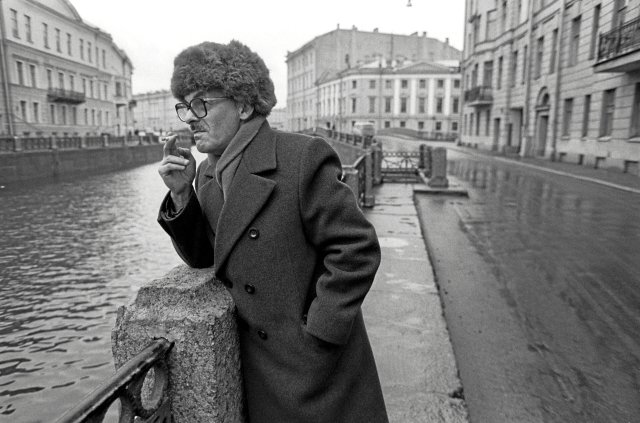Poems as landscapes in which one can walk: Bulat Okudschawa
Photo: IMAGO/ITAR-TASS/Jury Belinski
Shouting joy when I saw the volume »Bulat Okudschawa: My Century. “Songs and Poems” was discovered. Because I love the songs of this Russian chansonnier (1924-1997). How I wish I could hear them again. I immediately called Ekkehard Maaß, his poet, singer and editor. He said on the phone that it often took years of work to keep the German version as close to the original as possible. In the volume you can compare the original and the translation and assess what he has achieved. Because he has no poetic creed of his own to defend, he would not succumb to the temptation to assimilate others into himself. “For me, Bulat Okudschawa’s songs are like landscapes in which I can walk throughout my life without getting tired,” he writes in the afterword.
What a contrast to the self-absorbed Wolf Biermann, who wrote the foreword for the volume and advertised more for himself than for the book at the Leipzig Book Fair. “A literary interpreter must not follow the original with his tongue hanging like a dog,” he explains in the foreword. Vladimir Vysotsky, whom he calls a “screamer,” is probably closer to him than his “romantic counterpart,” this “dark Georgian Caucasian man” with the “Lenin-like bald head.”
Bulat Okudschava was born on May 9, 1924, when it was not yet “Victory Day,” to communist parents who he lost at an early age. The father, a high-ranking Georgian party official, was shot in 1937 as a “Trotskyist,” and the mother was sent to a Siberian labor camp for 18 years as the “wife of an enemy of the people.” The son grew up with his grandmother in Moscow and Georgia and volunteered for the front in 1942. Seriously wounded, he was the only one in his unit to survive.
I didn’t know that when I saw him for the first time in December 1976 in the Berlin Palace of the Republic. Just as I didn’t know a lot of things back then, I probably understood them in a more unconscious way or took what suited my mood. I won’t be the only one who rethinks the then and the now when reading this book. I involuntarily sang along: “The Song of the Moscow Ant,” the “Prayer” (“As Long as the Earth Still Turns”), “Mozart Plays on an Ancient Violin,” “He Finally Came and Entered the House,” or the “Georgian Song”. I also felt in tune with his pacifist statements (“War, damn you, what have you done to us”) back then. Today, the “Song of the Soldier’s Boots” gets under your skin more than ever.
Ekkehard Maaß writes that “between the lines, the suffering and sadness of the wars and dictatorships of the last century can be felt,” “which my German-Baltic ancestors also had to experience.” In their follow-up remarks, he and Katja Lebedeva emphasize the dissident nature of Okudschawa, which they both lived while I was editor for foreign literature at the “ND”. The Okudschawa volume with lyrics, sheet music, a record and an interview, published by Volk und Welt in 1985, has been on my shelf ever since.
What I read in Russian at the time remained in my memory verbatim. As something intrinsic – a sadness, a longing. Like the “sky blue balloon” from the song of the same name. It was true that the stands were often higher than the “victories” that were being celebrated. In general, questioning and brooding were part of the Soviet literature we loved. Katya Lebedeva is right that these “sad-ironic verses” offered an alternative to the official state culture with its “artificial cheerfulness and patriotic pathos.” Protest against stupid ideological things – from which you can (and should) turn away if you are a thoughtful person.
Bulat Okudzhava died on June 12, 1997. Perhaps today I perceive more clearly the pain that is so influential in his art. This poetic, melancholic tone – for me it was and is the sound of Moscow. “Ah Arbat, my Arbat” – just five years ago I was walking there one evening in May, humming Okudzhava’s song to myself.
Bulat Okudzhava: My century. Songs and poems. Russian German. Edited, rewritten and commented on by Ekkehard Maaß. Illustrations by Moritz Götze. Lukas-Verlag, 136 pages, br., 20 €.
nd Literature Salon with Ekkehard Maaß: May 15, 2024, 6 p.m., Franz-Mehring-Platz 1, Berlin.
Become a member of the nd.Genossenschaft!

Since January 1, 2022, the »nd« will be published as an independent left-wing newspaper owned by the staff and readers. Be there and support media diversity and visible left-wing positions as a cooperative member. Fill out the membership application now.
More information on www.dasnd.de/genossenschaft
